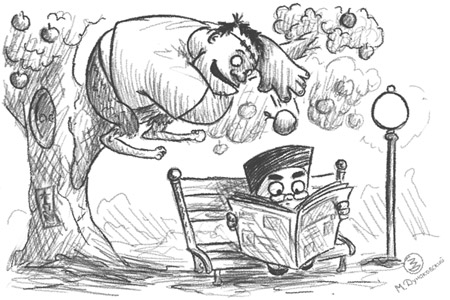Art children's books about sotsinzhiniring

Hello! Three years ago, I read a lecture in the children's camp about social engineering, trolled the children and some of the insane leaders. As a result, the subjects asked what to read. My duty answer about two books of Mitnick and two books of Cialdini, it seems, is convincing, but only for about an eighth-grader and older. If younger, then you need to scratch your head hard.
In general, the following is a very short list of the most common works of art. Easy, simple, children's. But about social engineering. Because in every culture there is a joker character who is a bit of a psychopath, a bit of a jester and a bit of an effective specialist. The list is incomplete, and I want to ask you to continue it.
Tom Sawyer
The first, of course, is "Tom Sawyer" and its unforgettable fence. For this one scene in the book, you can fall in love. And if you think that there is nothing further there, then you are cruelly mistaken. Sam Clemens (also known as Mark Twain) was the good old troll in ordinary life. For example, the most innocuous of his tricks was the replacement of cigarettes in an expensive box with cheap varieties - and the subsequent treats of distinguished guests with the knowledge of savoring such elite tobacco.
')
12 chairs
Absolutely magical stuff. Oddly enough, you can read from the age of nine. Dofig what will be incomprehensible, but it will still be interesting and fun (the main thing is to give the child a censored classic version without naked schoolgirls, lighting with Kisa Vorobyaninov). The book is simply insanely cool both in terms of language and in terms of social experience. Well, the continuation of the "Golden Calf" also pleases. By the way, if you like Ilf and Petrov, be sure to find a Soviet black and white film of 68, with Sergei Yurasky in the role of Ostap - there are interesting dialogues set up to insanity.
Dunno on the Moon
In general, this is a textbook on economics, where all the basic principles are presented very clearly and succinctly. Well, at the same time - different methods of negotiation and in general a lot of things. One feels the direct deep social order of the USSR to expose all sins of the capitalist community. But in order to denounce sins, they had to be very, very detailed. The texture here does not fail. Understood in detail.
Khoja Nasreddin
Two books - "Troublemaker" and "Enchanted Prince" - this is just a classic of the genre. There was probably nothing more to do with social necking before it. Only one scene with a cat before and after liver feeding costs half the book. Or, as he clearly explained to Agabek, where glass worms appeared in his eyes ... If you still know the story of Solovyov, from whom the guards took away the second manuscript, and then he was able to return it and publish this book as a cultural monument of the USSR - in general you become extremely happy and proud of the author. Khoja Nasreddin in his books is my favorite “joker” of all, perhaps.
It is worth remembering “Idris Shah's“ Dervish Tales ”(oh, some, like a chest story, just endure the brain).
Tim Thaler and sold laughter
Quite a serious thing in terms of explained concepts. He plunges into the world of advertising and marketing as best she can, and teaches all sorts of bad routings.
Ethicist
Good old Harrison. So old that he wrote even himself, it seems. And so kind that there is some kind of science-intensive concept in the book. Naturally, it is read more with pleasure than with benefit.
The Dragon
Actually, this is a play by Evgeny Lvovich Schwartz, but he has a lot of things in the lyrics. And this thing is read very easily, not as a script. You can come back to it once every two years and every time admire how beautifully everything is written.
The Adventures of Captain Blood
The thing on which you can add the impression of an idealized English gentleman. And draw a couple of useful things about planning tactics, with an emphasis on that part of game theory, which tells about simultaneous moves with an opponent. That is, about foreseeing his optimal strategy and using his own against his move.
Sherlock Holmes Stories
This thing teaches thinking. Unfortunately, the artistic nature of the text does not always make it clear in advance all the introductory, plus there are a couple of blunders in favor of the plot. But this is the very “smart is sexy”, which teaches that thinking is a tool that can be used with very good efficiency in different situations. Actually, probably, for the sake of it I also began to make the list.
Outside the plane of the books, two films are worth mentioning: the magical "Route 60" and the good old American "12 angry men" (do not confuse Mikhalkov with the remake).
And now a question for you: what else goes into this list?
Source: https://habr.com/ru/post/449148/
All Articles